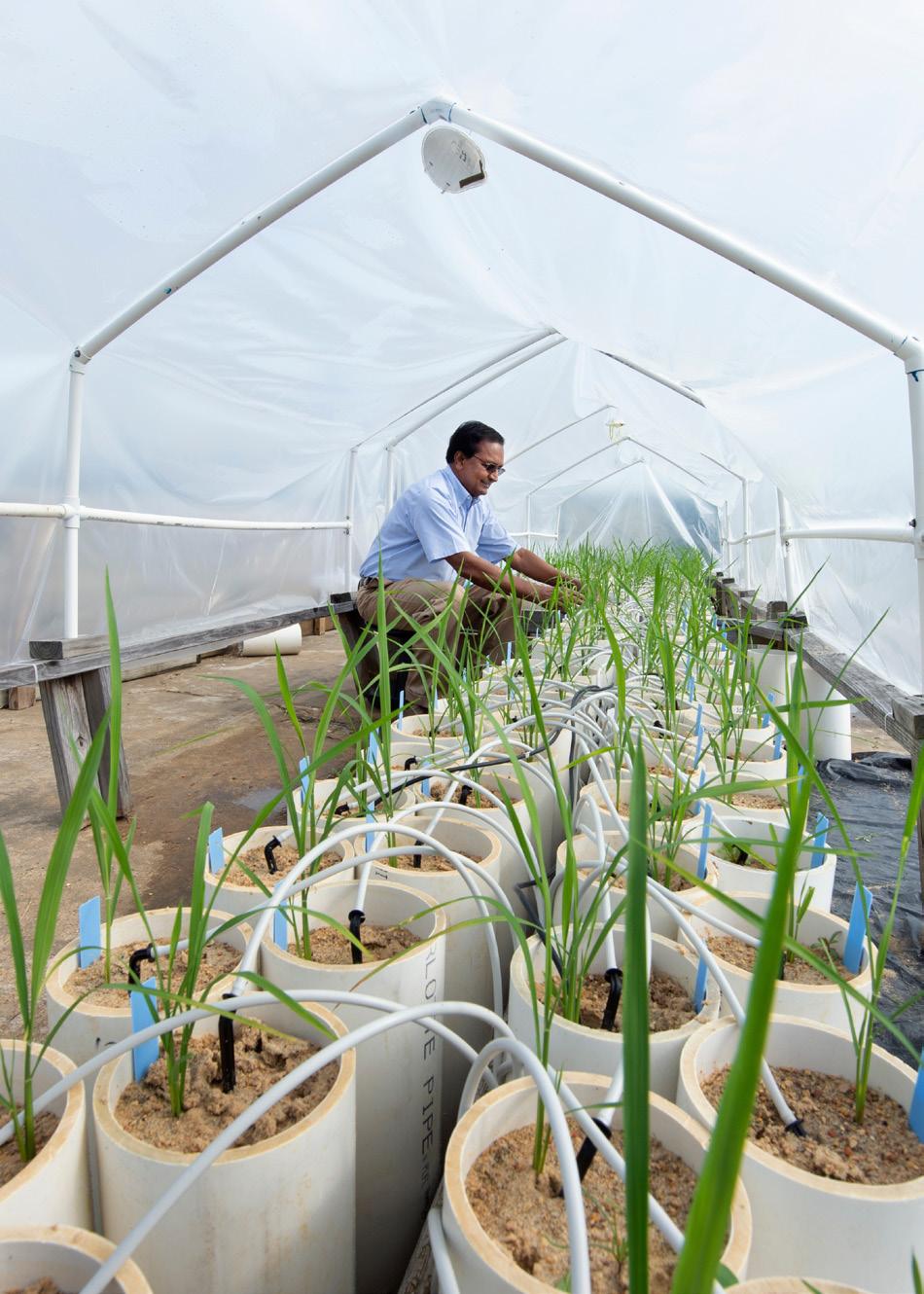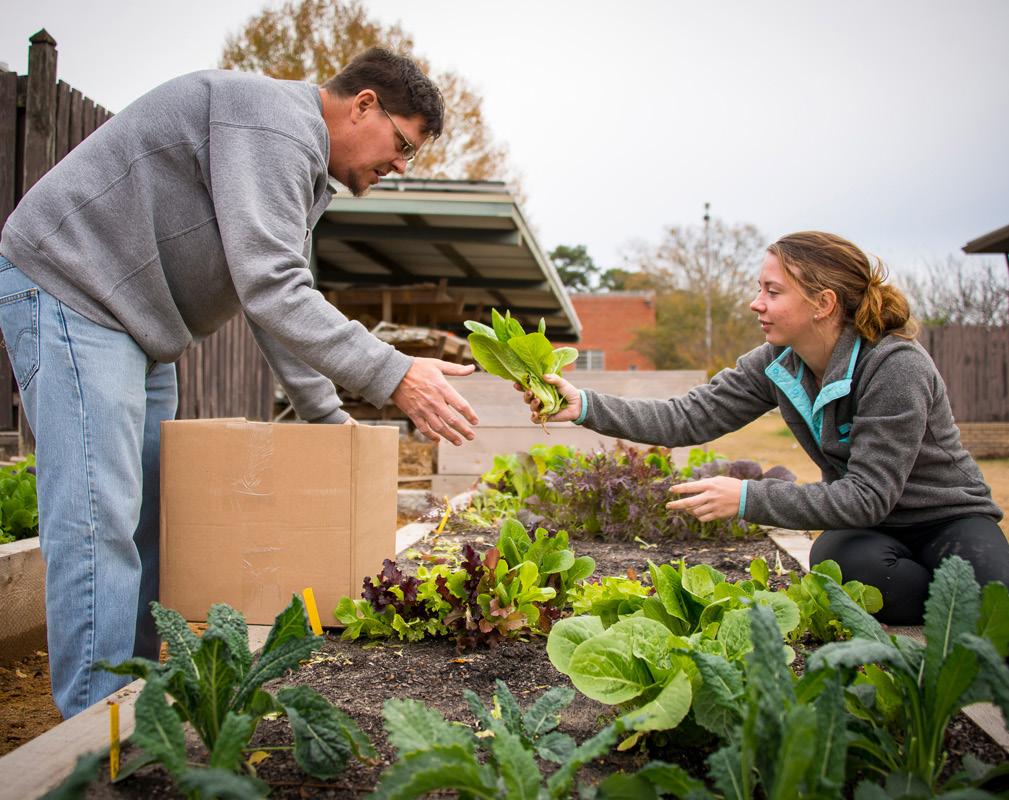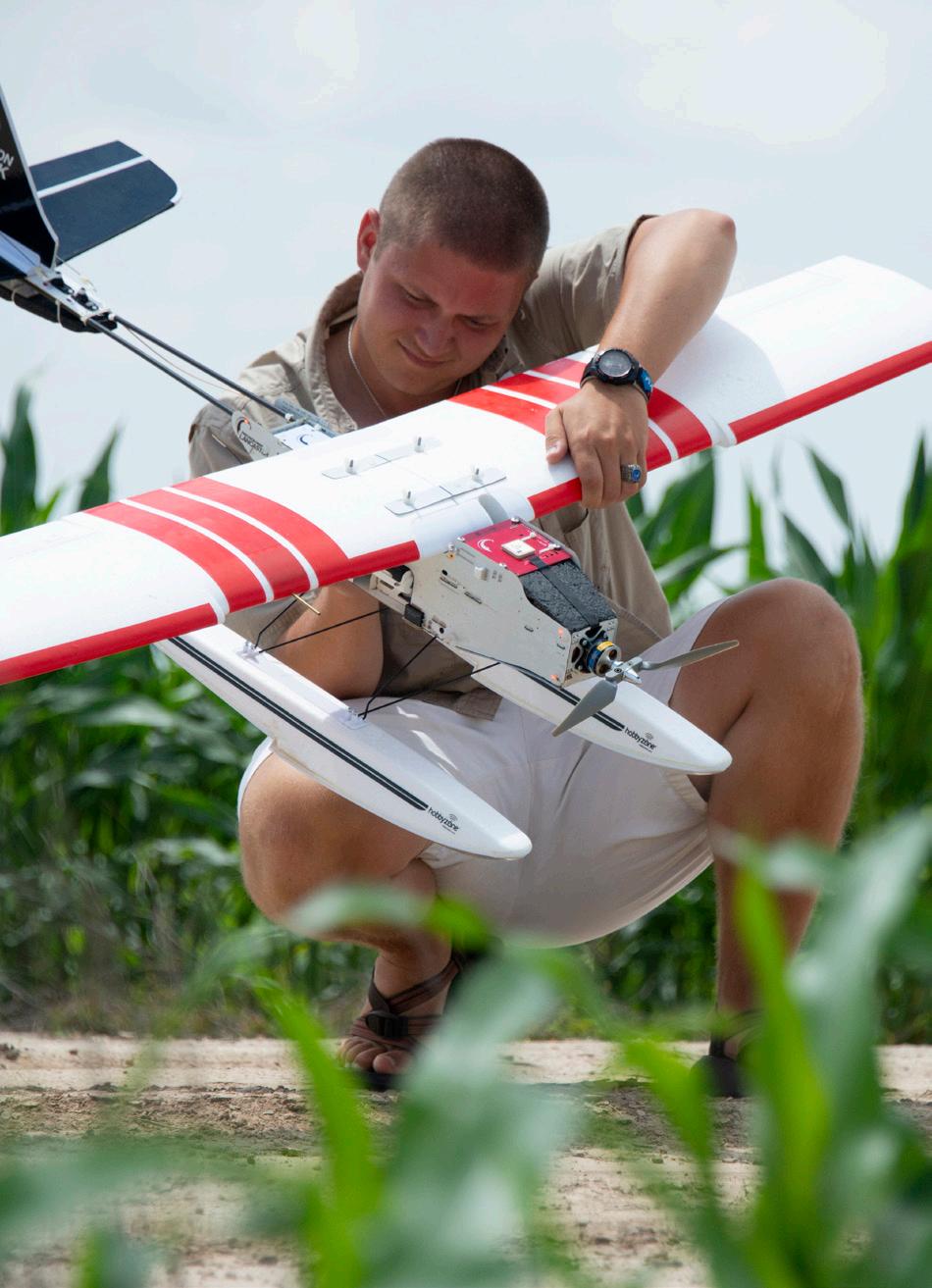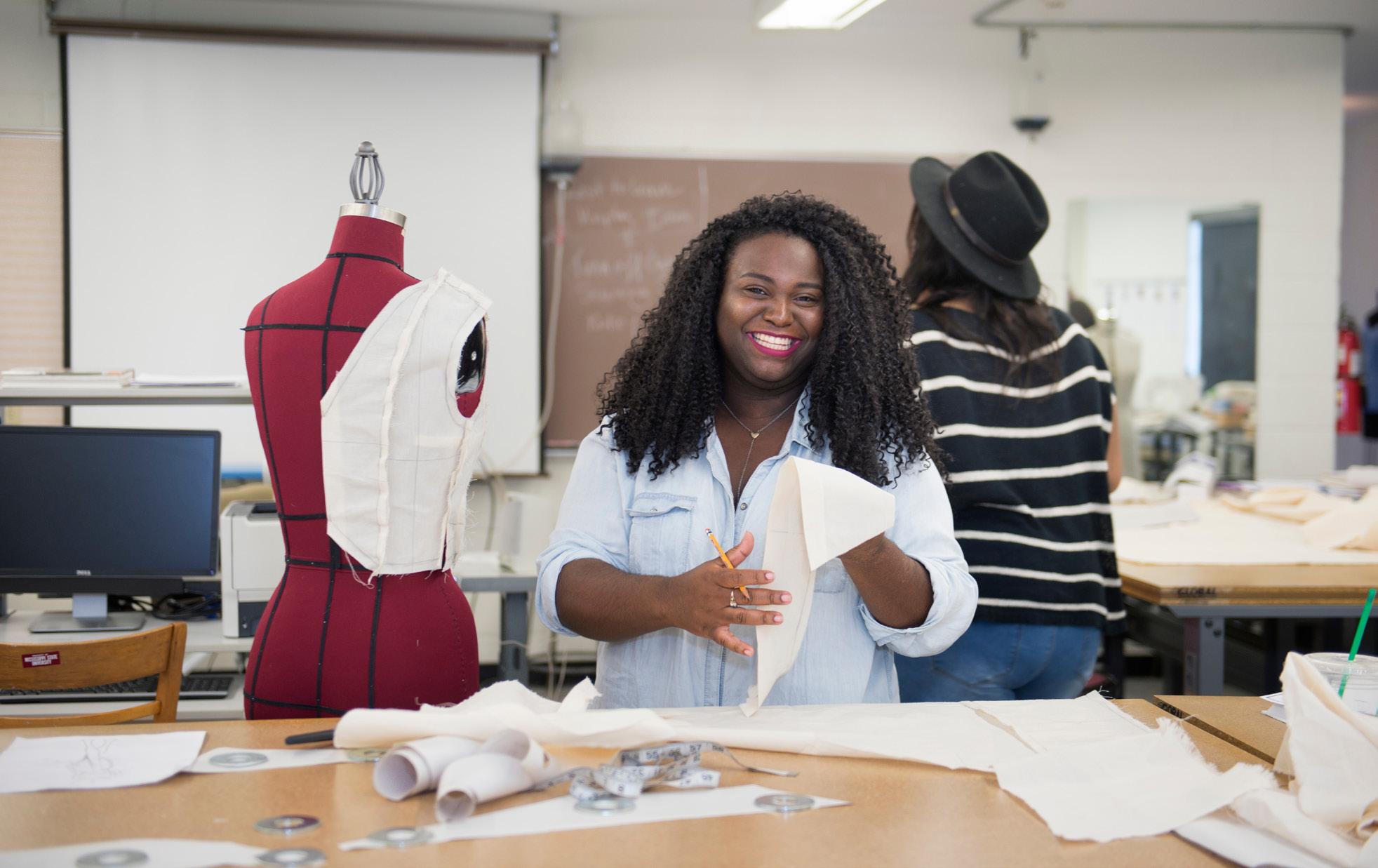
8 minute read
Agriculture and Life Sciences
noteworthy news
College of Agriculture and Life Sciences cultivates opportunities to sustain deep-rooted mission
As one of Mississippi State University’s oldest academic units and a foundational component to the land-grant’s establishment, the College of Agriculture and Life Sciences (CALS) is both a prominent leader in its respective fields and a promising venture, from which the seeds of innovation and discovery emerge. The work being done in CALS each day expands well beyond the lecture halls and laboratories and is ultimately shaping the world.
The study of agriculture was formalized into an academic college at the then-Agricultural and Mechanical College of the State of Mississippi in 1903. Today, CALS is one of the leading institutions dedicated to agriculture, life sciences, and human ecology in the Southeast. Encompassed by nine schools and departments, CALS presents a broad array of opportunities for academic study in the core components of society. From improving health outcomes and food safety, to pioneering more sustainable production systems to better feed and clothe a growing global population and preserving natural resources, CALS is at the forefront of meaningful research and education.
More than 2,300 students are currently enrolled and engaged in the college’s offerings, which include 17 majors and 46 concentrations for undergraduates and 17 majors and 41 concentrations for graduate students. In addition to a number of pre-professional programs and minor fields of
study, CALS also offers five certificate programs to further enhance academic training.
The college is also closely associated with the Mississippi Agricultural and Forestry Experiment Station (MAFES) and the Mississippi State University Extension Service. Such symbiosis further enables the renowned faculty and researchers within the collaborative units to share knowledge and solutions with students, farmers, businesspeople, and government agencies throughout the state and beyond.
ACADEMIC ENVIRONMENT
CALS is a renowned leader in applied science, from which new discoveries and potential are emerging each day. Such innovation requires significant investments in facilities that adequately reflect the quality and everchanging needs of the college’s faculty and students. The recent completion of the animal science complex, located at the corner of Blackjack Road and Hail State Boulevard, answers this call and expands several areas of study and interdisciplinary programming within CALS and MAFES.
The complex houses three separate buildings—the Meat Science and Muscle Biology Laboratory, the Animal and Dairy Science Building, and the Poultry Science Building— that collectively add nearly 80,000 square feet to the CALS campus footprint. The facilities will further enhance MSU’s national and international leadership in agricultural sciences research and education and the university’s outreach efforts to assist Mississippi’s livestock farmers. Naming opportunities are available within the facilities and offer powerful ways for alumni and friends to create a meaningful legacy in the college.
Following completion of the new complex, the college is now shifting its focus to Ballew Hall, which formerly served as the main animal and dairy science building since opening in 1962. The historic structure will be renovated to serve as the new home of CALS and will also include office space for the Division of Agriculture, Forestry, and Veterinary Medicine and MAFES Experiment Station.
Ballew Hall, along with the University Florist, the Mississippi Entomological Museum, and the Child Development and Family Studies Center, make up just a small portion of CALS’ infrastructure. Encompassed by 15 buildings on campus, as well as a vigorous portfolio of nontraditional learning spaces, including 560 acres of working farmland, 10 greenhouses, 1,650 acres of pastureland, aquaculture ponds, an award-winning dairy, and a renowned turfgrass breeding nursery, the diverse environment of CALS is well-equipped to prepare students for rewarding careers in agriculture and the life sciences.
FACULTY EXPERTISE
Cultivating young professionals in agriculture and life sciences is a task CALS faculty embrace. Faculty



within the college are creative-thinking, problem-solving practitioners in their fields who are instilling a balanced foundation for approaching complex issues and better positioning students for success far beyond the classroom and the pages of textbooks.
In addition to preparing students for the future workforce, CALS faculty holding an appointment in the Mississippi Agricultural and Forestry Experiment Station conduct research that lays the groundwork for transformative breakthroughs in agriculture, medicine, and more. This research helps stakeholders from individuals to industry to governmental leaders make informed decisions on everything from best management practices to policies that improve outcomes for both producers and the environment. However, the dedicated faculty that drive such efforts are highly sought after. As MSU competes with other universities and industries, endowments for professorships and faculty chairs are critical to attract and retain these top-notch leaders.
The college currently houses three endowed faculty positions—the Dr. Glover B. Triplett Endowed Chair in Agronomy, the Milton Sundbeck Professorship in Animal and Dairy Science, and the Edgar and Winifred B. Hartwig Endowed Chair in Soybean Agronomy, all established with gifts by their namesakes. CALS leadership is currently working to fill the Hartwig Chair, which was brought to fruition in part by the Mississippi Soybean Promotion Board. This investment, which complements the organization’s own mission, demonstrates the value of strategic partnerships. Additional chairs and professorships are particularly needed through endowment-level gifts to grow priority research opportunities and expertise in other commodity areas.
INNOVATION AND TECHNOLOGY
Leveraging MSU’s distinction by the Federal Aviation Administration (FAA) as a national leader in academic research for the advancement of unmanned aircraft systems (UAS), CALS is working with the university’s UAS task force to advance precision agriculture training with two new flight courses. While the primary curriculum focuses on preparing aspiring pilots to pass the certification required by the FAA to fly unmanned aircrafts commercially, the courses also offer hands-on flight instruction and the chance for students to build and operate their own UAS apparatuses.
The flight courses are part of a growing number of precision agriculture offerings available at MSU. In 2015, the Diane Hawks Precision Agriculture Curriculum Endowment was created by its namesake to build upon CALS’ prior concentration offering in the area and assist in the establishment of a collaborative precision agriculture certificate program. Studies in both the certificate program and area of concentration benefit from the

endowment’s perpetual support, allowing students to immerse themselves in a range of advanced applications from global positioning and geographic information systems to remote sensing. These hands-on learning experiences equip students with the skills necessary to collect and analyze enlightening data that can enhance food production and assist the industry in becoming more efficient and sustainable.
Yet, not all precision-based developments require advanced technology or flight systems. Oftentimes, a shift in perspective or the pursuit of a single idea is all it takes to make a positive difference. Thanks to support from alumni couple Barry and Lana Knight that created the World Food Prize Mississippi Youth Institute Fund in their name, MSU is also able to offer opportunities for high school scholars from across the state to get involved in such progressive approaches through the globally recognized program. Held on campus each year, the event encourages students to discuss food security issues and solutions with global experts, broadening capacities for critical thinking and solution-driven collaboration.
Private support for programming and outreach in these areas enables CALS to address global challenges and provide students with international perspectives and experiences to help prepare them for their professional careers.
OPPORTUNITY AND PROGRESS
True to its roots, CALS continually strives to increase accessibility to higher education, seeking unmatched education and well-being for all. CALS’ recent addition of online graduate degree offerings in agribusiness, animal and dairy sciences, and early intervention open new entry points for ambitious students to learn and engage from afar.
Opportunities also abound for undergraduate students, particularly those in community colleges. A new culinology pathway agreement allows students in Mississippi Gulf Coast Community College’s Culinary Arts Technology program to earn a bachelor’s degree in culinology from the Department of Food Science, Nutrition and Health Promotion. Similar agreements have been forged in Poultry Science, including a dual-degree program offered with Alcorn State University.
STUDENT EXPERIENCE
Students are the future and an investment in their lives impacts everyone. Current CALS students are the pioneers of tomorrow who will be setting policy, sustaining natural resources, developing food and fiber to feed and clothe increasing populations, fighting the diseases of the 21st century, combating the spread of infections among animals and humans, and answering the demands

of a growing world. Thankfully, the hands-on learning experiences that characterize the college are readying today’s students for tomorrow’s pressing needs.
In the School of Human Sciences’ Fashion Design and Merchandising program, students benefit from additional opportunities to better comprehend the supply chain path of America’s favorite textile through the program’s valuable relationship with Cotton Incorporated. Similar synergetic partnerships offer advantageous opportunities for CALS students to grow their skill set, gain comprehensive, working-knowledge, and build their professional networks, and are also valuable to businesses and industry off campus who rely on the knowledge and innovation fostered through the college.
Accordingly, support for student internships is a high priority. Alumni and friends can help advance these opportunities by investing in scholarships that afford students the chance to accept positions at nonprofits and other nontraditional areas that offer great exposure and experience but would otherwise not provide the essential financial compensation upon which most students rely.
Support that enables undergraduate students to get involved in research and pursue a more in-depth prospectus is also critical to student success. The George Hopper Student Development Fund, established this year in honor of the college’s recently retired dean, is an excellence fund that bolsters enhanced learning through awards for travel, scholarships, and other

essential resources. Additional gifts to the fund can ensure perpetual support and a lasting legacy.
Private support drives funding from other sources and allows CALS to create innovative approaches to address the most challenging needs facing our world—from alleviating world hunger and protecting our most valuable resources, to building resilient communities and helping future generations reach their full potential.
More on the College of Agriculture and Life Sciences can be found at www.cals.msstate.edu as well as via Facebook @MSUCALS, and Twitter and Instagram @ MSUAG. For assistance with giving opportunities, contact Will Staggers, the college’s director of development, at 662.325.2837 or wstaggers@foundation.msstate.edu.
STORY ADDIE MAYFIELD PHOTOGRAPHY OFFICE OF AGRICULTURAL COMMUNICATIONS AND OFFICE OF PUBLIC AFFAIRS










